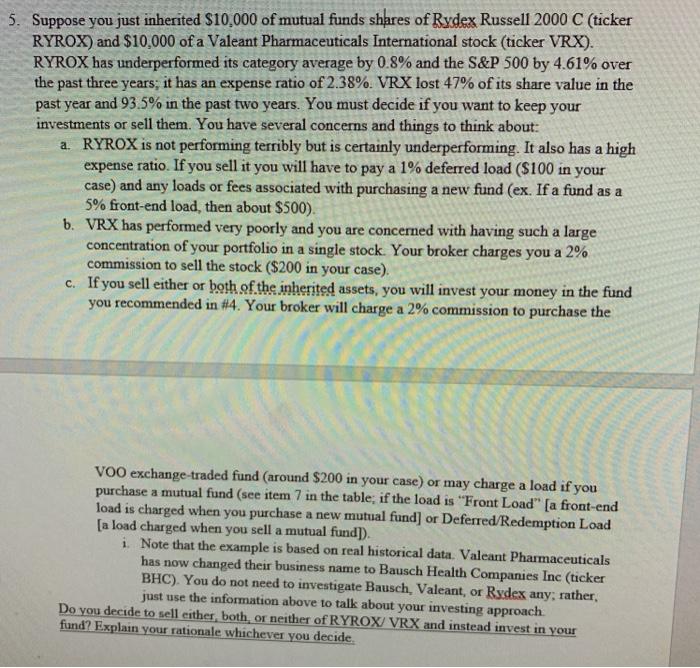5. Suppose you just inherited $10,000 of mutual funds shares of Rydex Russell 2000 C (ticker RYROX) and $10,000 of a Valeant Pharmaceuticals International stock (ticker VRX). RYROX has underperformed its category average by 0.8% and the S&P 500 by 4.61% over the past three years; it has an expense ratio of 2.38%. VRX lost 47% of its share value in the past year and 93.5% in the past two years. You must decide if you want to keep your investments or sell them. You have several concerns and things to think about: a. RYROX is not performing terribly but is certainly underperforming. It also has a high expense ratio. If you sell it you will have to pay a 1% deferred load ($100 in your case) and any loads or fees associated with purchasing a new fund (ex. If a fund as a 5% front-end load, then about $500). b. VRX has performed very poorly and you are concerned with having such a large concentration of your portfolio in a single stock. Your broker charges you a 2% commission to sell the stock ($200 in your case). c. If you sell either or both of the inherited assets, you will invest your money in the fund you recommended in #4. Your broker will charge a 2% commission to purchase the VOO exchange-traded fund (around $200 in your case) or may charge a load if you purchase a mutual fund (see item 7 in the table, if the load is "Front Load" (a front-end load is charged when you purchase a new mutual fund) or Deferred/Redemption Load [a load charged when you sell a mutual fund]). i. Note that the example is based on real historical data. Valeant Pharmaceuticals has now changed their business name to Bausch Health Companies Inc (ticker BHC). You do not need to investigate Bausch, Valeant, or Rydex any, rather, just use the information above to talk about your investing approach. Do you decide to sell either, both or neither of RYROX VRX and instead invest in your fund? Explain your rationale whichever you decide 5. Suppose you just inherited $10,000 of mutual funds shares of Rydex Russell 2000 C (ticker RYROX) and $10,000 of a Valeant Pharmaceuticals International stock (ticker VRX). RYROX has underperformed its category average by 0.8% and the S&P 500 by 4.61% over the past three years; it has an expense ratio of 2.38%. VRX lost 47% of its share value in the past year and 93.5% in the past two years. You must decide if you want to keep your investments or sell them. You have several concerns and things to think about: a. RYROX is not performing terribly but is certainly underperforming. It also has a high expense ratio. If you sell it you will have to pay a 1% deferred load ($100 in your case) and any loads or fees associated with purchasing a new fund (ex. If a fund as a 5% front-end load, then about $500). b. VRX has performed very poorly and you are concerned with having such a large concentration of your portfolio in a single stock. Your broker charges you a 2% commission to sell the stock ($200 in your case). c. If you sell either or both of the inherited assets, you will invest your money in the fund you recommended in #4. Your broker will charge a 2% commission to purchase the VOO exchange-traded fund (around $200 in your case) or may charge a load if you purchase a mutual fund (see item 7 in the table, if the load is "Front Load" (a front-end load is charged when you purchase a new mutual fund) or Deferred/Redemption Load [a load charged when you sell a mutual fund]). i. Note that the example is based on real historical data. Valeant Pharmaceuticals has now changed their business name to Bausch Health Companies Inc (ticker BHC). You do not need to investigate Bausch, Valeant, or Rydex any, rather, just use the information above to talk about your investing approach. Do you decide to sell either, both or neither of RYROX VRX and instead invest in your fund? Explain your rationale whichever you decide







